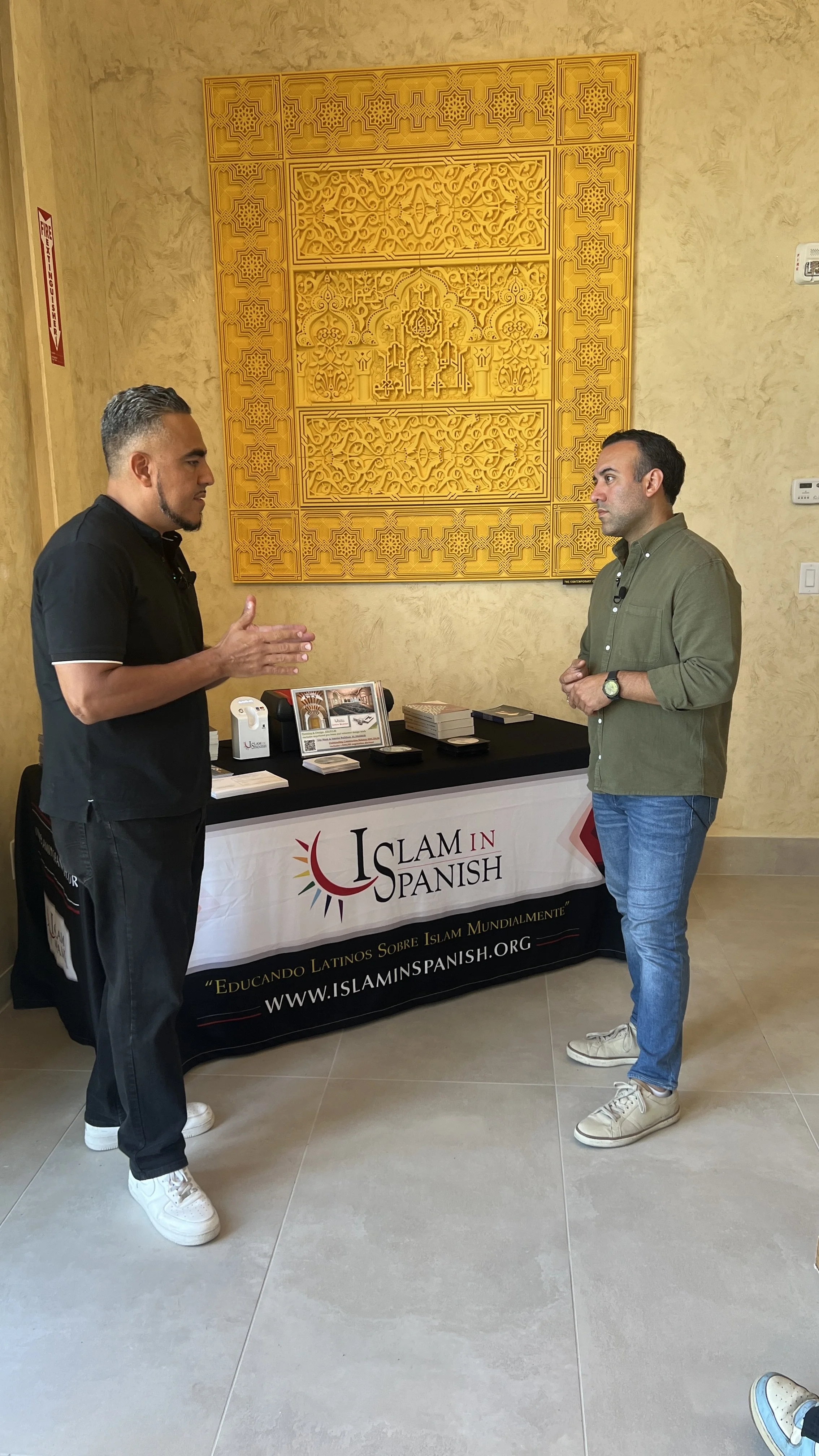Featured on KPRC News Houston | Houston Muslims introduce Spanish-speaking Islamic education, community center in Alief
In the below article KPRC reporter Bill Barajas and Ahmed Humble visited the IslamInSpanish Centro Islamico to do a story for their Hispanic Heritage Month segment aired on 9/18/2024
The center also serves as a youth community space and mosque while also highlighting the Latino/Hispanic historical connection to Islam.
HOUSTON – Spanish-speaking Muslims are not new, especially in Houston, but chances are you might not know too many. A newly opened education and community center in Alief hopes to fix that by highlighting the historical connections and creating accessible materials for people to understand what led them on this soul-searching journey.
At the helm of Centro Islamico located on Brant Road under the Alief watertower is Jaime “Mujahid” Fletcher, founder of the Houston nonprofit, IslamInSpanish.
Though the stigma of Islam and most American Muslim converts (or reverts) continues even decades since 9/11, Fletcher as well as other members of Centro Islamico seek to show how the religion created a redemptive avenue and a sense of purpose. Fletcher, for example, was able to seek guidance from a higher power after spending much of his youth in a life of crime.
“I was the leader of a gang growing up here here in Alief,” he explained. “I was looking for more of a purpose.”After a year of serious studying and contemplation, Fletcher and his now wife, Sandy ‘Sakinah’ Gutierrez, who also serves as Centro Islamico’s interior designer and the COO for IslaminSpanish, became Muslim.
“When you first walk in, you’ll find a mural that was made by a local artist, and it ties in with the Andalusian type of design that you’ll see repetitive here in this prayer hall as well as in the museum,” Gutierrez explained. “So there’s a lot of elements that are inspired from the Andalusian history and arts, and then we mixed that because that’s where we’re from.”
Having embraced Islam months before September 11, 2001, Fletcher found himself inadvertently being an ambassador for Muslims at the beginning of heightened Islamophobia.
“Our family didn’t know what Islam was,” Fletcher explained. “And then when they looked at my wife changing her dress, right? She wore the headscarf and it was a personal decision she made. But her family was feeling a certain way, thinking that I forced her to do that. And I’m new in Islam and I don’t even know why she did that to begin with.”
Even Fletcher’s own parents were concerned about the sudden lifestyle changes. Having come originally from Colombia, and raised Catholic, it all just seemed so strange to his loved ones.
“I stopped so many things that just weren’t positive in my life, so even though it was strange that change looked almost too good to be true, they thought that it was a phase,” he explained.
However, he did not want to impose Islam on his loved ones just because of the positive changes he was making. But his new behavior inspired those closest to him to understand what exactly was bringing about this drastic change in him, nonetheless. That’s when he realized there was a gap in materials in a language they could understand.
“Eventually everyone was like, ‘Man, he doesn’t drink anymore. Did he join a cult or what?’ Because there are several parties all the time and I just didn’t eat certain things, but I was happy,” Fletcher continued. “And then when they looked into it more and more, they realized that they didn’t have information.”
Through his education in digital media, Fletcher was able to start promoting Spanish-translated books and audio for people who were interested in understanding Islam. To his surprise, both his parents wound up embracing Islam as well.
The conversations Fletcher would have by sharing his journey into embracing Islam is what eventually enabled him to open the doors to a center in an area where he grew up and rewrite the wrongs he did, while also providing an educational bridge for other Muslims like him to understand their way of life.
He argues that because people are afraid of things they do not know, bridging that misunderstanding through knowledge, is the main crux behind the message Centro Islamico serves to tell.
That’s why, while there is a prayer space that holds Friday services (the Muslim holy day), the 10,000 square-foot building serves as a community and educational center, with its use of Spanish architecture and building a museum space in the center for people to understand that Latinos embracing Islam, should not be viewed as a foreign concept.
“This center is almost like Islam on display,” he explained. “Like for the regular society to come and look and see what a prayer area looks like; the museum telling 800 years worth of history of Muslims from Spain.
“A lot of times people think Islam is a form of religion from overseas, an Arab cultural religion,” Fletcher continued. “And Islam was the native religion in Spain, where many of us have roots.”
These messages and materials are available worldwide and for anyone interested in learning about Islam, the Muslim community, or understanding their journey.
“All of our material is produced and distributed for free. So the whole organization operates based on regular individual donations. It’s a nonprofit,” Fletcher said. “And we have made accessible in regards to Spanish literature about Islam that wasn’t accessible or even existent when we became Muslim right before September 11th.”
Because Centro Islamico is not in the proselytizing business, there’s no catch.
“What are they going to do with that information? That’s up to them,” Fletcher explained. “There’s no compulsion in any sort of like ideology. And that’s what I liked about Islam and the Muslims when I met them.”
Certainly, Fletcher and everyone at Centro Islamico can provide that open dialogue with their center by creating an environment that welcomes curiosity with open arms and warm hearts. This is why Gutierrez, Fletcher’s wife, says the center operates differently like having a cafe area and a youth room filled with graffiti where children and teens can spend time in.
“Something that’s really cultural for us is being able to drink coffee,” she said. “Any day that you come, you will find coffee brewing...we’re Colombian so having a cafe was really important for us. We want people to come. We want them to stay, ask questions, converse -- even if they don’t have questions and they just want to observe, we’re very transparent and open in that way.”
Admittedly, these are things you might not find in an ordinary mosque, so there has been some pushback from other Muslims, but in trying to help alleviate any nerves people may have without offending others just because they don’t know what to do.
“Because we’ve been through the process ourselves of not knowing what Islam was,” Gutierrez explained. “The way that we designed the space and every space was very much looking at what our experience was and trying to minimize the tension or the fear that people might have.
“We don’t want you to come in and be like, ‘Whoa, I don’t know what to do,” she concluded. “As soon as you walk in, you’re going to see a lounge, a cafe, graffiti on the wall, ‘Like, whoa, OK. This is familiar.’ You’re going to see a museum. ‘OK, this is familiar.’ like, this is something that I can relate to, something that I might be interested in to learn a little bit more. And then if they feel comfortable enough or not, come into the prayer room. But if they don’t, we leave it open where they can observe. We’re not hiding anything, we want you to come.”
Currently, Centro Islamico is doing a soft launch but will be holding a grand opening on November 16. The center is open to the public and has sermons during Friday prayers in Spanish at 1:30 p.m. and in English at 2:30 p.m.
About the Authors - KPRC Channel 2 Houston
Ahmed Humble
Historian, educator, writer, expert on "The Simpsons," amateur photographer, essayist, film & tv reviewer and race/religious identity scholar. Joined KPRC 2 in Spring 2024 but has been featured in various online newspapers and in the Journal of South Texas' Fall 2019 issue.
Bill Barajas
Reporter, proud Houstonian, U of H alumni, and lover of all the hometown sport teams.




